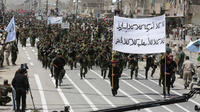-
Civilian deaths in Gaza conflict are not automatically a war crime
Civilian shielding of its facilities is a declared Hamas military tactic. The evidence of rocket pits and weapon dumps located in, around and under mosques, schools, homes and hospitals is incontrovertible. Constant broadcasts calling upon, as well as occasional physical forcing of, the populace to protect Hamas assets with their bodies are well-documented. It is sickening that Hamas chose not to build public bomb shelters in Gaza, despite using hundreds of thousands of tons of concrete on military tunnels to initiate hostilities with Israel. The tragic Palestinian death toll does not demonstrate Israeli attacks are disproportionate to legitimate military objectives. It does display a disgusting strategic decision by Hamas to exploit civilians to shield its combatants. Its civilian deaths generate selective outrage in support of its political and economic goals. This atrocity committed by Hamas against its own Gazan population is where an honest war crime investigation would begin.
-
-
Increasing Hezbollah activity in Europe worries security officials
This month, it was revealed that Hezbollah agents operating in Europe made procurements for “parts and technologies” in Bulgaria which would allow them to operate surveillance drones in the country. The activities on the part of Iran-partnered Hezbollah over the past two years mark a historical change in terms of their European operations and planning — a rise in activity following a lower profile after their more renown activities of the 1980s.
-
-
DHS slow to inspect high-risk chemical plants
Congress passed the $595 million Chemical Facility Anti-Terrorism Standardsprogram in 2006 to help regulate high-risk chemical facilities, but nearly a year after the massive chemical explosion at a West, Texas, fertilizer plant, a new report found little improvement in securing threats from the U.S. 4,011 high-risk chemical facilities.As of 30 June, DHS has not yet conducted security compliance inspections on 3,972 of the 4,011 high-risk chemical facilities.
-
-
Immigration cases clog immigration courts across the country
The highly publicized mass immigration of Central American children into the United States — roughly 57,000 over a little under a year — many court systems are facing a crisis as the number of judges, lawyers, and juries available cannot keep up with demand. Across the United States, that caseload reached 375,373 trials last month — an average of 1,500 per each of the country’s 243 immigration judges. Some rescheduled cases are being pushed back as late as 2017.
-
-
Alabama did not share enough DHS funds with local governments
An audit by the DHS inspector general’s office found that Alabama’s Homeland Securityprogram has not met the conditions of receiving DHS grants, as it fails to share adequate grant money with local governments. The audit, completed in May, found that of the $20.5 million awarded to Alabama for homeland security projects between 2010 and 2012, the state agency gave less than the required 80 percent of funds to local governments.
-
-
Continued funding for S.C. mixed-oxide fuel (MOX) plant – at least until fall
Federal legislators have secured the funds to keep the mixed-oxide fuelplant (MOX) at the Savannah River Sitein South Carolina moving forward at least into fall, according to South Carolina governor Nikki Haley and members of the state’s congressional delegation. The 310-square mile site once produced components for nuclear weapons, but since the agreement with Russia to turn nuclear weapons into reactor fuel, the site has focused on repurposing and cleanup.
-
-
ISIS’s appeal to Islamist recruits grows as al Qaeda seen as stale, tired, and ineffectual
Advances by militant groups like the Islamic State of Iraq and Syria (ISIS) in the midst of turmoil in the Arab world, while al-Qaeda’s aging leaders remain relatively silent, have led would-be terrorists and Islamic scholars to question al-Qaeda’s influence on global Jihad and its would-be fighters. Within the social circles of potential militant recruits, al-Qaeda is increasingly seen as stale, tired, and ineffectual.
-
-
California builds a sophisticated Emergency Response Training Center
Citing the need for further emergency training, some Sacramento County officials have proposed a plan to construct a $56 million training facility for Californian emergency responders which would handle all types of training and scenarios.
-
-
“Independent” Kurds need Baghdad more than they’d like
Iraqi Kurds are in a unique position to declare independence in defiance of a seemingly powerless central government in Baghdad following the rapid disintegration of Iraq in the face of the Islamic State in Iraq and As-Sham (ISIS) onslaught. But is independence as simple as that, a fait accompli resulting from a series of unpredictable events? Unpalatable as it may sound to Iraqi Kurds, the KRG needs Baghdad far more than it is prepared to admit. By all means, the Kurdish Regional Government (KRG) should seek to leverage a better deal out of Baghdad — the Kurdish armed forces, or peshmerga, are vital to the fight against ISIS. In terms of full independence, though, the costs seem to outweigh the benefits at present.
-
-
More Westerners join ISIS following the group’s successes in Iraq

Of the 10,000 foreign fighters who have already joined militant groups in Syria and Iraq, 3,000 hold European or other Western passports, making it easy for them to travel across most borders. U.S. officials report that as many as 100 foreign fighters hold U.S. passports, leading to worries that foreign fighters may return to the United States to launch an attack.
-
-
U.S. mulls ways to handle complex child immigration issue
The influx of unaccompanied children crossing into the United States has reached crisis proportions, with 90,000 now in the United States. The children are escaping violence and deprivation in Honduras, Guatemala, and El Salvador, but a George W. Bush-era law prevents their rapid repatriation. Leading Republicans want to change the law, but many Democrats condition such a change on folding it into a comprehensive immigration reform.
-
-
Plans for nationwide 911 dispatch centers advance
Municipalities across the country are planning to connect 911 dispatch centers in an effort to improve information sharing. Plan is to connect dispatchers via the Internet, which will allow centers quickly to transfer calls, 911 text messages, photos, videos of accident scenes, and other information. The technology is part of a “Next Generation 911” initiative already being implemented across the country.
-
-
9/11 Commission: U.S. faces new and dangerous terrorist threat
The members of the 9/11 Commission, led by Chairman Tom Kean and Vice Chairman Lee Hamilton, released a new report the other day to reflect what they describe as the altered but dangerous terrorist threat facing the United States. Members of the commission say that ten years after the release of the commission’s original report, with increasing threats from the resurgence and transformation of al Qaeda, Syria, and a rapidly changing cyberspace, the commission’s new report calls for a vigorous and proactive counterterrorism effort.
-
-
Israel destroys al-Wafa hospital in Gaza City; cabinet considering expansion of Gaza operations

One of the first targets on the first day of the current round of war between Israel and Hamas was al-Wafa hospital in eastern Gaza City. As is the case with other hospitals in Gaza, Hamas used the facility to store rockets and other arms and shelter Hamas fighters, who also use the hospitals’ upper floors for snipers to shoot at IDF soldiers and for rocket launching – some witnessed by a Financial Times reporter. In the case of al-Wafa, the hospital also served Hamas as a command-and-control center. Yesterday (Wednesday), Israel decided that enough was enough, and that allowing Hamas fighters the freedom to operate behind the patients and staff at the hospital, located in central Gaza City, posed too much of a risk for Israeli forces, and Israel Air Force (IAF) planes finished the destruction of the hospital — after the staff heeded IDF warnings and vacated the facility with the remaining patients. A series of powerful secondary explosions proved that the hospital served Hamas for arms storage. The Israeli cabinet is meeting this morning to consider the expansion of the ground war.
-
-
U.K. launches inquiry into radiation poisoning of former KGB agent
British authorities have announced that a public inquiry will be held into the death of former Russian KGB officer who became a British citizen, Alexander Litvinenko.Litvinenko, 43, died in 2006 after he was poisoned with radioactive polonium while drinking tea with two former KGB agents at a London hotel.
-
More headlines
The long view
Preventing Another 'Jan. 6' Starts by Changing How Elections Are Certified, Experts Say
The 2024 presidential election may be a rematch between President Joe Biden and former President Donald Trump, but preventing a repeat of Jan. 6, 2021 — when false claims of a stolen election promoted by Donald Trump and his allies led to an insurrection at the U.S. Capitol —will be top of mind this election year. Research finds broad support among public for nonpartisan certification commissions.
States Rush to Combat AI Threat to Elections
This year’s presidential election will be the first since generative AI became widely available. That’s raising fears that millions of voters could be deceived by a barrage of political deepfakes. Congress has done little to address the issue, but states are moving aggressively to respond — though questions remain about how effective any new measures to combat AI-created disinformation will be.
Chinese Government Hackers Targeted Critics of China, U.S. Businesses and Politicians
An indictment was unsealed Monday charging seven nationals of the People’s Republic of China (PRC) with conspiracy to commit computer intrusions and conspiracy to commit wire fraud for their involvement in a PRC-based hacking group that spent approximately 14 years targeting U.S. and foreign critics, businesses, and political officials in furtherance of the PRC’s economic espionage and foreign intelligence objectives.
European Arms Imports Nearly Double, U.S. and French Exports Rise, and Russian Exports Fall Sharply
States in Europe almost doubled their imports of major arms (+94 per cent) between 2014–18 and 2019–23. The United States increased its arms exports by 17 per cent between 2014–18 and 2019–23, while Russia’s arms exports halved. Russia was for the first time the third largest arms exporter, falling just behind France.
LNG Exports Have Had No Impact on Domestic Energy Costs: Analysis
U.S. liquified natural gas (LNG) exports have not had any sustained and significant direct impact on U.S. natural gas prices and have, in fact, spurred production and productivity gains, which contribute to downward pressure on domestic prices.
Don’t Buy Moscow’s Shameless Campaign Tying Biden to Its Terrorist Attack
Russia has offered many different explanations to the ISIS-K’s 22 March 2024 terrorist attack at the Crocus City Hall in Moscow, but the most recent explanation offered by Russia is the most audacious yet: Russia now charges that the Ukrainian energy company Burisma financed the attack. Burisma is at the center of an effort by a congressional committee to impeach President Biden, but the case has all but collapsed. Hunter Stoll writes that Russia’s disinformation and propaganda apparatus appears to be searching for ways to keep Burisma in the news ahead of the U.S. presidential election.
